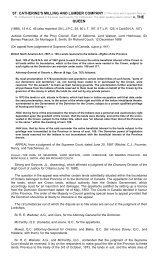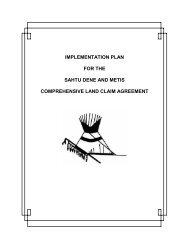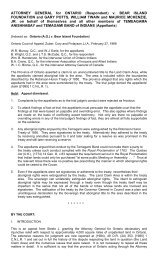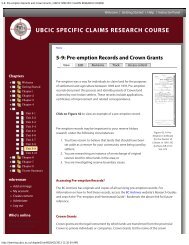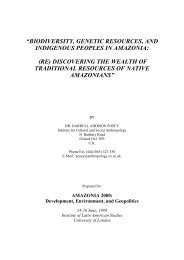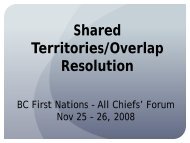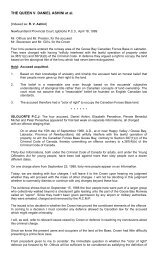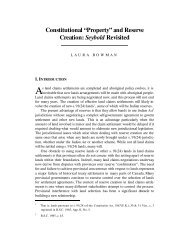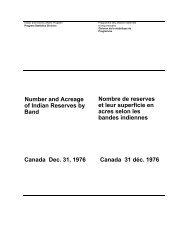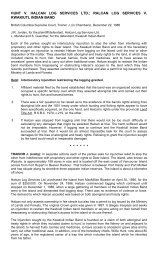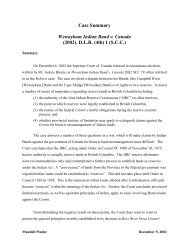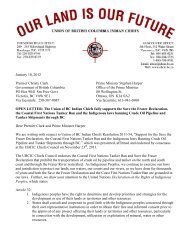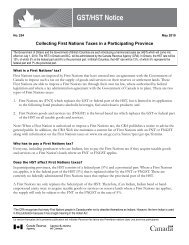ATTORNEY-GENERAL OF ONTARIO v. FRANCIS ET AL.
ATTORNEY-GENERAL OF ONTARIO v. FRANCIS ET AL.
ATTORNEY-GENERAL OF ONTARIO v. FRANCIS ET AL.
- No tags were found...
Create successful ePaper yourself
Turn your PDF publications into a flip-book with our unique Google optimized e-Paper software.
would arise, if any, to the province upon the lands of this reserve being ceded by the Indians to theCrown, or the reserve becoming wholly unnecessary by reason of the bands of Indians becomingextinct, etc.I then thought that the relief that the plaintiff should have was the declaration as to the reserveand its boundaries to which I have before referred, and that, in other respects, the action shouldbe dismissed, for I did not see that the defendants claiming under licences from the OntarioGovernment could in this action have any relief against the plaintiff, and I thought that they wereentitled to none against their co-defendants.It was then said, however, that in the case The Queen v. St. Catharines Co., which was pendingbefore the Privy Council upon an appeal, it was likely or probable, from the nature of some of thearguments before that court and some remarks that were reported to have been made by some ofthe learned judges, that there would be an expression of opinion regarding the "quality", as it wascalled, of the Indian title, although that action was upon a subject and in regard to rights orsupposed rights quite different from the matter involved in this action. For this reason thisjudgment has been delayed till the present time.I have now had an opportunity of perusing the judgment of the Privy Council in that action uponthe appeal to them. They have not seen fit to discuss or decide anything as to the quality of theIndian title, considering that unnecessary for the determination of the appeal before the Council;and after a careful perusal of the whole of the judgment, I am of the same opinion as at the closeof the argument. I think the decision does not and cannot affect in any degree in favor of theplaintiff the rights and matters in contention in this action, but, as some of the statements orexpressions in the judgment might be thought at first view to have some bearing upon the mattersof this action, I will refer to these and say very shortly why they have in my opinion no suchbearing.One of these is: "The enactments of section 109 are, in the opinion of their Lordships, sufficientto give to each province, subject to the administration and control of its own Legislature, the entirebeneficial interest of the Crown in all lands within its boundaries which at the time of the unionwere vested in the Crown, with the exception of such lands as the Dominion acquired right tounder section 108, or might assume for the purposes specified in section 117. Its legal effect is toexclude from the 'duties and revenues' appropriated to the Dominion all the ordinary territorialrevenues of the Crown arising within the provinces." The court then refers to Attorney General v.Mercer.This comprehensive language must, in my opinion, be applied to the subject matter of the casethen under consideration. The lands in that case had been ceded to the Crown by the Indians bythe Treaty of 1873, and had thus been disencumbered of the Indian title. If there were doubt as tothis way of looking at or constructing the passage, it is made, I think, plain by the concluding partof that portion of the judgment in which their Lordships decide against the contention on behalf ofthe Dominion Government in respect to the ceded territory, rested on the provisions of section91(24). The passage is: "Their Lordships are, however, unable to assent to the argument for theDominion founded on section 91(24). There can be no a priori probability that the BritishLegislature, in a branch of the statute which professes to deal only with the distribution oflegislative power, intended to deprive the provinces of rights which are expressly given them inthat branch of it which relates to the distribution of reserves and assets. The fact that the power oflegislating for Indians and for lands which are reserved for their use has been entrusted to theParliament of the Dominion is not in the least degree inconsistent with the right of the provinces toa beneficial interest in these lands available to them as a source of revenue whenever the estateof the Crown is disencumbered of the Indian title."In that case the lands in question has been disencumbered of the Indian title, as before stated,by the Treaty of 1873. In the present case the lands have not been ceded and have not been sodisencumbered, besides, the latter part of the passage discloses the view of the court as to theperiod at which the beneficial interest spoken of becomes available to the province as a source ofrevenue, namely, when the estate of the Crown is freed from the Indian title, and seems to me notto consist with the argument before me respecting a trust existing in the Province for the benefit ofthe Indians. Then afterwards the court said: "The treaty leaves the Indians no right whatever in thetimber growing upon the lands which they gave up, which is now fully vested in the Crown, allrevenues derivable from the sale of such portions of it as are situate within the boundaries ofOntario being the property of that province", indicating in addition to what I have before said thatthe Indians had before the treaty or surrender rights in respect of the timber, a consequence ofwhich would seem to be that it may be used by them or for their benefit until such time as their titlebecomes extinguished by cession, surrender or otherwise.A careful perusal of the judgment of the Privy Council shows, I think, that it does not militate in



